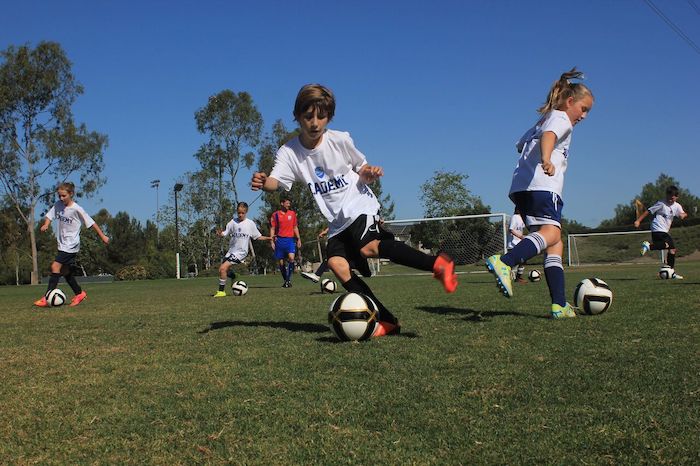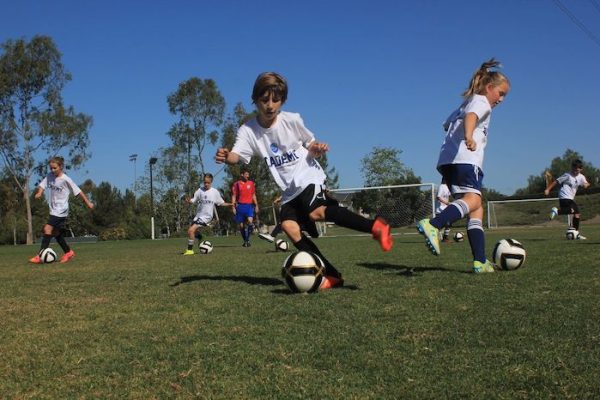Expert tips on choosing the best soccer camp to fit your kid’s age, skill level and overall goals.

Soccer is one of the most popular summer camps on ActivityHero’s marketplace. Played by over 2 million nationwide, youth soccer appeals to kids of all ages and skill levels. With both recreational and travel soccer leagues, there are many year-round opportunities for both beginner and elite players. It’s also a sport that can be introduced at an early age, with many kids soccer camps accepting those as young as 3 years old.
The right soccer camp depends on your kid’s age and motivation. Does your kid dream of being the next Lionel Messi or Alex Morgan? Or, do you simply want a fun camp to keep your kid active when school’s out? Here are three simple steps to review in your selection process.
1. Assess Your Kid’s Age & Level of Development
From preschool to high school, soccer camps structure their programs to meet kids at various levels of development.
The emphasis of soccer camp is to help young players foster a love of the game.
American Youth Soccer Organization
- Ages 3-5: The focus for younger players is primarily on strengthening gross motor skills, socialization and having fun! Soccer drills for preschoolers are mostly multipurpose games to keep players active, listening and making friends. Soccer camps for ages 3-5 offer mini sessions structured to engage short attention spans.
- Ages 6-9: For elementary school-aged kids, soccer camps often divide players up by age and ability to maximize instruction. While some very advanced players will start to play at a competitive level, most soccer camps for ages 6-9 years old focus on team building, social skills, and technical skill development.
- Ages 10-13: For motivated players, this is the age when soccer development is taken to the next level. Developing technique, speed of play and simulated game situations are all a priority.
- Ages 14+: High school soccer players will have a wide range of skill and motivation ranging from recreational to students eyeing a college soccer scholarship.
2. Know the Different Types of Soccer Camps
There are many different soccer camps available to fit your schedule and kid’s goals. with week-long programs including half-day soccer camps and full-day soccer camps. The programs are open to all players and the curriculum is developmentally appropriate for any skill level.
If your high school player has a summer job lined up, there are specialized night training programs for intermediate to advanced soccer players aged 15-21. Some travel leagues or competitive soccer high school programs may encourage team camps, residential overnight camps or college ID soccer camps.
There are also specialty programs such as goalkeeper camps or striker soccer clinics. These camps concentrate on developing specific skills related to your kid’s preferred playing position.
3. Learn the Benefits of Soccer, Beyond the Field
Over time, soccer generally develops into a fun, lifetime participation sport. Kids will understand the value of teamwork and respect while also developing leadership and communication skills.
“Active kids grow in self-confidence. They have the opportunity to develop an open mindset. They learn conflict resolution skills, how to both cooperate and compete with others, punctuality and responsibility. How to contribute to a group, communication skills, how to lead, how to set and achieve goals toward self-improvement are also learned. The possible life skills, as well as sport skills, that an active soccer player could benefit from is a long list.”
Sam Snow, US Youth Soccer Director of Coaching
Soccer Camp Gear
There are a few items that you will want to pack for soccer camp.
- Soccer gear: Cleats and Shin Guards. Sneakers work too.
- Water bottle: Your kid will be working up a sweat!
- Packed Lunch and/or Snacks: Keep in mind that most camps will not have a refrigerator.
- Sunscreen: Campers are usually outside in the sun for several hours.
Quick Tip: If you bring a soccer ball, be sure to label it with your kid’s name.
Regardless of your kid’s age or skill level, there is a soccer camp that is the right fit for your family. Discover more soccer camps on ActivityHero and download the iPhone app. Be sure to check out special discounts may save you even more on camp.

















